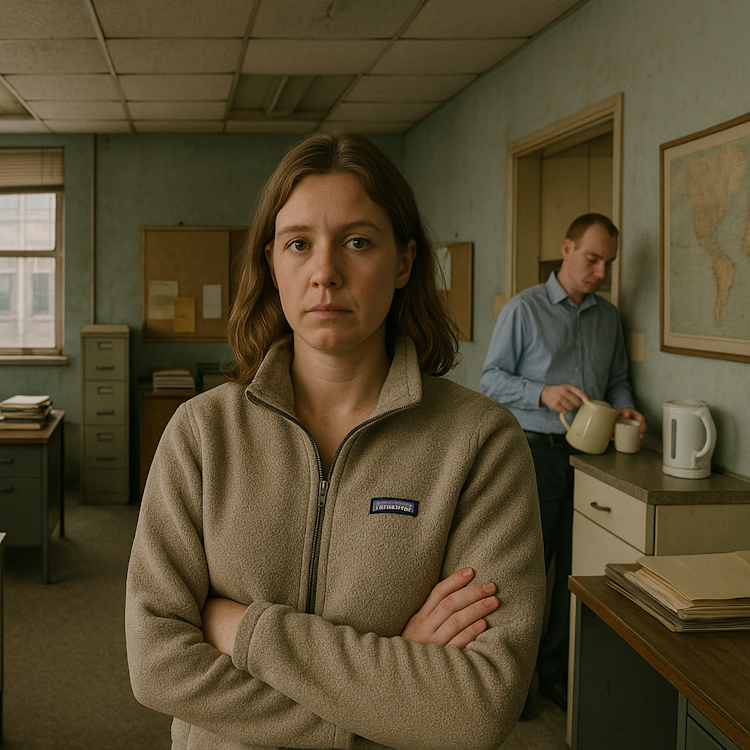Rosie Wood nervously toyed with the zipper of her fleece as she read the email from Rebecca for the fourth time that morning. The message, subject line “Urgent: Series B follow-on,” had been sitting in her inbox for six days.
All Rebecca needed was $25m. The founder had been fundraising for months and still hadn’t found a backer for her latest round. Rosie believed in the business and knew the numbers were there. Normally, her firm Streetwise Ventures would have been all too happy to follow on.
Instead, Rebecca was getting radio silence from the investor that owned 20% of her business.
Reading through the email one more time, Rosie tried to unzip her fleece, only to remember it was broken. She closed her laptop and sighed. There certainly wouldn’t be any new merch without any viable path to raising Fund II.
In the kitchen, one of her few remaining colleagues and the firm’s sole remaining GP, David, was making himself a tea. Over the past year, the others had been laid off or departed for firms with more certain futures once it became clear that a second close on Fund II was impossible.
“Rebecca emailed again,” Rosie said, pouring water into the Nescafé that replaced their broken Nespresso machine.
Without looking up from the milk he was pouring, David asked, “I hope you didn’t reply. We’ll reply when we’re ready, but not now.”
They both knew it was cruel, but Rosie couldn’t argue back. Rebecca’s company had been the first company that Streetwise backed out of Fund II. After raising a spectacular $150m Fund I to back Series A companies, they had planned to raise a $300m Fund II so they could back even more great founders. They had closed $100m, which they had deployed at record speed, cutting cheques in some of the most competitive, high-profile deals, but paying steep prices. As soon as the team started pushing for a second close, LPs started pushing back on the premiums Streetwise had paid for its recent deals. Now, there was no money to follow on in Rebecca’s company.
Rosie took her coffee back to her desk to prepare for a call with a secondaries firm to which she had been trying to sell a few portfolio stakes from Fund I. David had taken to calling her “Chief DPI Officer,” which would have been a joke unless things weren’t so dire.
The call with the secondaries investor went better than Rosie expected, and she breathed a sigh of relief. They looked interested in buying, and didn’t ask for too steep a discount. Not terrible, considering.
She looked up and watched David go into a phone booth to take a call. Judging from his slumped shoulders, it was a conversation with an LP. Two years ago, he would have been going in with a smile, telling them about Fund II’s stellar valuations and pitching them on Fund II. Now, he was trying to convince several institutional LPs not to invoke a “key personnel clause” that would allow them to withhold the rest of their committed capital after the firm’s other two GPs had left...
Rosie opened David’s Google calendar to see who else her boss would be grovelling to that day, and recognised the name of a large, state-backed investor, the anchor LP for Fund I. Losing this investor for Fund II had been the other blow that made a second close impossible. Now that the political winds had changed, this state-backed investor was putting less money into the ecosystem. Rosie felt like the high valuations on Streetwise portfolio had been just the excuse they’d been looking for to not commit again.
Go big or go boutique
At least that was one difficult conversation she didn’t need to have that day. Rosie looked at her phone, exhausted. That evening, she was going to be meeting with her friend Sarah, who worked at a much larger fund. It had just closed a $1.5bn fund for Series A companies, had a 25-person platform team and huge offices in Soho. She knew Sarah would try and convince her again to jump ship and join a bigger investor.
Everything was consolidating around these funds, while mid-size, generalist, emerging managers like Streetwise were left stranded. They couldn’t compete on pricing and brand with the biggest funds, and couldn’t compete on speed and specialism with smaller, boutique funds. Either you had to come in at pre-seed with a big cheque or wait until the company had significant traction; Streetwise was in the no-man’s land in the middle.
Rebecca wasn’t the only founder who was suffering from Streetwise’s dysfunction. One company had signalled at the last board meeting that they needed to pivot but would need some more runway; Rosie knew Streetwise wouldn’t be able to contribute, but David had still put on a brave face at the board meeting and said Streetwise would do what it could to support.
A few months later, Rosie read a LinkedIn post from Rebecca saying that her startup had shut down. She didn’t mention Streetwise, and simply said that the company had found fundraising difficult. Rosie felt her stomach twist; she knew everyone would assume that Rebecca’s company simply hadn’t met the growth targets necessary, not that her financial backers had been the problem.
Then, a week later, a Sifted article appeared in which Rebecca was interviewed about closing up her company and the personal toll the failure took on her. Rosie shivered as she read the words on her phone: “I couldn’t sleep at night, I was losing my hair. I don’t think I will ever do something as hard as firing all my incredible staff who believed in this business.”
When Streetwise shut down a while later, there was no media coverage. The VC — like many others — simply faded away, leaving founders to shoulder the blame for failures that weren't entirely their own and pension fund LPs to explain why one stellar VC was now dead in the water.
Rosie, meanwhile, joined Sarah's fund in their gleaming Soho offices, with their working espresso machine and unbroken zippers. She landed safely, as VCs usually did. Her LinkedIn profile made no mention of Streetwise's failures, only her "experience scaling early-stage ventures" and her "track record of value creation."



